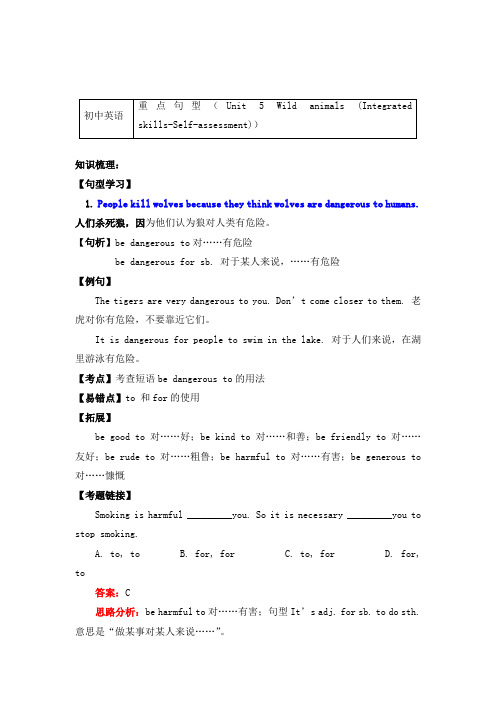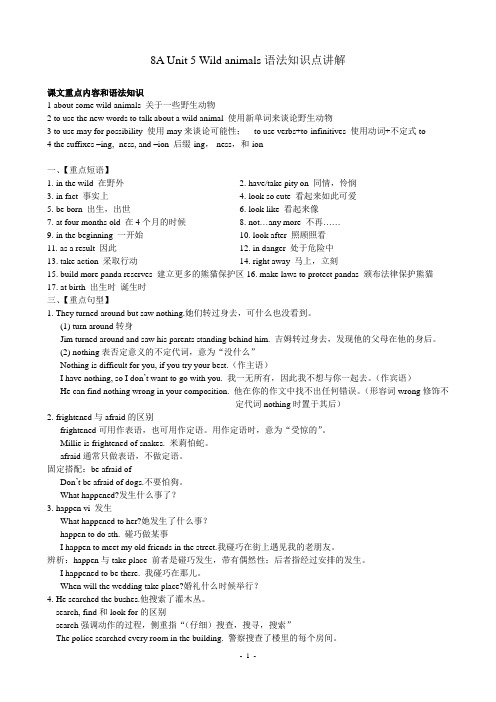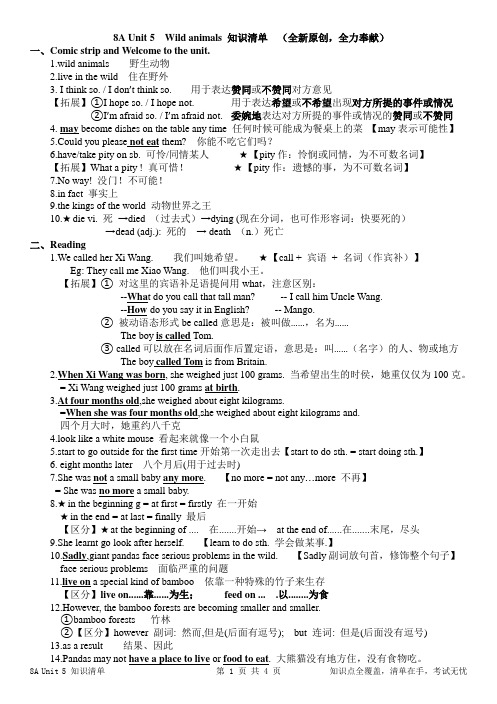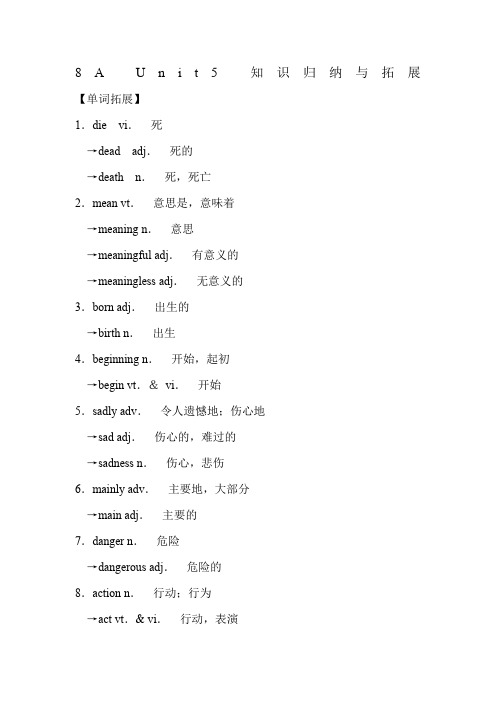05牛津译林版 8A Unit 5 Wild animals语法知识点
- 格式:doc
- 大小:54.50 KB
- 文档页数:4

牛津译林英语8A Unit 5 Wild animals短语句型语法复习提纲一、重要词组1 不可能/没问题 no way / no problem2 采取行动take action3 同情,怜悯 have / take pity on4 实际上,事实上in fact5 大熊猫giant panda6 出生,出世 be born7 出生时,诞生时at birth8 一开始,起初at / in the beginning / at first9 在…开始时at the beginning of …10 最后,终于 in the end / at last / finally11 在…的末端,在…结束时at the end of …12 以食…为生,靠…生活live on …13 因此as a result14 处境危险/ 脱离危险in danger / out of danger15 整个冬天through the winter16 立刻,马上 right away / at once17 迷路get lost / lose one’s way18 与…同样the same … as …19 你的真诚的 yours sincerely20 在白天in the daytime21 在四个月大时at four months old22 砍倒cut down23 失去居住地 lose living areas24 作为一个团队而工作/成群地活动work as a team25 面临严重的问题face serious problems26 动物世界之王the king of the animal world27 …的故事the story of …28 学会照料自己learn to look after oneself29 解决,解出 work out30 在它们的一生中during their lives31 制定法律保护熊猫make laws to protect pandas32 跳来跳去jump around33 走近,靠近go near …34 在…的帮助下with the help of … / with one’s help35 闹着玩儿地 for fun36 对人来说是危险的be dangerous to humans37 多可恶啊!/ 真可惜!What a shame! / What a pity!38 听到这个我很难过。

译林牛津8 A Unit 5 Wild animals【教材内容解析】1. Comic strip(1)Would you like to live in the wild, Eddie? (P. 56)wild此处用作不可数名词,意为“自然环境、野生状态”,in the wild表示“在野外”,另外,wild还可以表示“野生的”。
例如:Can the baby pandas live in the wild on their own? I like wild animals.(2)Why not? (P. 56)why not后常跟动词原形,构成“Why not do sth.?”意为“为什么不做某事呢?”,相当于“Why don’t you do sth.?”。
例如:Why not go swimming? Why don’t you/we go swimming?(3)Wild animals are free and happy. (P. 56) free此处表示“自由的、不受拘束的”,还可以表示“免费的、空闲的”。
例如:You are free to go anywhere you wish. There is no free lunch in the world.I’m free today. Let’s go to the cinema.(4)---So could you please not eat them?---No way! (P. 56)①Could you please+动词原形?意为“请你……好吗?”否定形式为:Could you please not+动词原形?表示“请你不要……好吗?”两者都表示委婉的请求。
例如:Could you please speak a little louder? Could you please not sit here?①No way! 意为“不行、不可能、没门儿”,表示不同意或者拒绝。

Unit 5 Wild Animals一、重点单词1.free 自由的adj.,freedom自由n.2.have /take pity on sb. 同情某人We should have pity on the weak. 对病人,我们应该要有同情心。
3.(die死,v. ) (dying垂死的,adj.) (dead,死的,adj.) (death,死,n.)4.be born 出生I was born in 1976. 我出生于1976年。
5.in the beginning,at the beginning of , 一开始6. live on 以食...为生,Vampires live on blood.吸血鬼以吸血为生。
7.(danger 危险n.)(dangerous 危险的,adj.)in danger 处境危险8.action 行为,行动,n. take action采取行动9.right away 立刻,at once 马上10. none没有一个(人或物)否定回答,表示什么也没有11.at birth 出生时,诞生时12.get lost迷路at a lose 迷茫13.the same ...as与... 一样She has the same book as you.二、重点句型1.When Xi Wang was born, she weighed just 100 grams and looked like a white mouse.2. It is v ery difficult for pandas to have babies.3. However, the bamboo forests are becoming smaller and smaller.4.Giant pandas are now in danger. We should take action right away.5.If we do nothing soon there may be none left! However, we do believe that where there is Xi Wang, there is hope.6.We shouldn’t buy fur coats any more.三、重点语法1.May 的用法(1)“may”表达许可例:You may have the cake now.(现在你可以吃蛋糕了。

知识梳理:【句型学习】1. People kill wolves because they think wolves are dangerous to humans.人们杀死狼,因为他们认为狼对人类有危险。
【句析】be dangerous to对……有危险be dangerous for sb. 对于某人来说,……有危险【例句】The tigers are very dangerous to you. Don’t come closer to them. 老虎对你有危险,不要靠近它们。
It is dangerous for people to swim in the lake. 对于人们来说,在湖里游泳有危险。
【考点】考查短语be dangerous to的用法【易错点】to 和for的使用【拓展】be good to 对……好;be kind to 对……和善;be friendly to对……友好;be rude to 对……粗鲁;be harmful to对……有害;be generous to 对……慷慨【考题链接】Smoking is harmful _________you. So it is necessary _________you to stop smoking.A. to, toB. for, forC. to, forD. for, to答案:C思路分析:be harmful to对……有害;句型It’s adj. for sb. to do sth.意思是“做某事对某人来说……”。
2. Sadly, they have fewer and fewer living areas.令人伤心的是,它们生活的区域越来越少。
【句析】这里的fewer and fewer是形容词比较级的并列连接,表示“越来越……”【例句】There are fewer and fewer tigers in the world.=The number of tigers in the world is becoming smaller and smaller.世界上老虎的数量越来越少。

8A Unit 5 Wild animals语法知识点讲解课文重点内容和语法知识1 about some wild animals 关于一些野生动物2 to use the new words to talk about a wild animal 使用新单词来谈论野生动物3 to use may for possibility 使用may来谈论可能性;to use verbs+to-infinitives 使用动词+不定式to4 the suffixes –ing, -ness, and –ion 后缀-ing,-ness,和-ion一、【重点短语】1. in the wild 在野外2. have/take pity on 同情,怜悯3. in fact 事实上4. look so cute 看起来如此可爱5. be born 出生,出世6. look like 看起来像7. at four months old 在4个月的时候8. not…any more 不再……9. in the beginning 一开始10. look after 照顾照看11. as a result 因此12. in danger 处于危险中13. take action 采取行动14. right away 马上,立刻15. build more panda reserves 建立更多的熊猫保护区16. make laws to protect pandas 颁布法律保护熊猫17. at birth 出生时诞生时三、【重点句型】1. They turned around but saw nothing.她们转过身去,可什么也没看到。
(1) turn around转身Jim turned around and saw his parents standing behind him. 吉姆转过身去,发现他的父母在他的身后。

8A Unit 5 Wild animals 知识清单(全新原创,全力奉献)一、Comic strip and Welcome to the unit.1.wild animals 野生动物2.live in the wild 住在野外3. I think so. / I don’t think so. 用于表达赞同或不赞同对方意见【拓展】①I hope so. / I hope not. 用于表达希望或不希望出现对方所提的事件或情况②I’m afraid so. / I’m afraid not. 委婉地表达对方所提的事件或情况的赞同或不赞同4. may become dishes on the table any time 任何时候可能成为餐桌上的菜【may表示可能性】5.Could you please not eat them? 你能不吃它们吗?6.have/take pity on sb. 可怜/同情某人★【pity作:怜悯或同情,为不可数名词】【拓展】What a pity ! 真可惜!★【pity作:遗憾的事,为不可数名词】7.No way! 没门!不可能!8.in fact 事实上9.the kings of the world 动物世界之王10.★die vi. 死→died (过去式)→dying (现在分词,也可作形容词:快要死的)→dead (adj.): 死的→ death (n.)死亡二、Reading1.We called her Xi Wang. 我们叫她希望。
★【call + 宾语+ 名词(作宾补)】Eg: They call me Xiao Wang. 他们叫我小王。
【拓展】①对这里的宾语补足语提问用what,注意区别:--Wha t do you call that tall man? -- I call him Uncle Wang.--How do you say it in English? -- Mango.②被动语态形式be called意思是:被叫做……,名为……The boy is called Tom.③ called可以放在名词后面作后置定语,意思是:叫……(名字)的人、物或地方The boy called Tom is from Britain.2.When Xi Wang was born, she weighed just 100 grams. 当希望出生的时侯,她重仅仅为100克。

牛津译林版8AUnit5 Wild animals基础考点大梳理一、必会单词1.wild野生的;自然环境,野生状态2.free自由的,不受束缚的3.thick厚的,密的,浓的4.dolphin海豚5.panda熊猫6. squirrel松鼠7. zebra斑马8. stripe条纹9. bat蝙蝠10.bee蜜蜂11. wolf狼12. insect 昆虫13. tail尾巴14. illness疾病15. danger危险16. action行动;行为17. reserve (动植物)保护区18. pity遗憾,可惜19. shame憾事;羞愧20. hunter猎人21.catch捉住,捕获22.kill杀死23.die死24.lose失去二、常考短语1. wild animals野生动物2. live in the wild在野外生存3. any time任何时候4.no way不可能5. have/take pity on同情,怜悯6.in fact实际上,事实上7. be born出生8. look like看起来像9. at four months old在四个月大的时候10. for the first time首次,第一次11. no..any more不再12. in the beginning 开始13. look after herself照顾她自己14. for example例如15. as a result 因此16. live on以食....为生17. in danger处境危险18. take action采取行动19.right away立刻,马上20. at first首先21.at birth出生时,诞生时22. get lost迷路23. the same...as....样24. with the help of 在......的帮助下25. for a while一会儿26. far away遥远的27. be dangerous to humans对人类有危险28. catch...for...因为....而捕捉.....29. because of因为30. lose one's life失去生命31. be good at擅长32. in the daytime在白天33. sleep through the winter冬眠三.综合用法1. Why not+do sth.?表示提建议,意为“为什么不做某事呢?2. Could you please ( +not) +do sth.?请你(不要)做某事好吗?3. What..do you like best?你最喜欢的....是什么?4. look作连系动词,其后接形容词作表语。

8A Unit 5 Wild animals第1课时Comic strip & Welcome to the unit 单词1.野生的adj.自然环境,野生状态n.2.自由的,不受束缚的adj.3.一道菜;盘,碟n.4.同情n.5.死vi.6.海豚n.7.大熊猫n.8.松鼠n.9.斑马n.短语1.野生动物2.随时成为餐桌上的菜3.同情,怜悯4.实际上,事实上5.动物世界之王6.看起来如此的可爱7.<口>不可能句型1.埃迪,你想生活在野外吗?2.没有它们,我会死的。
3.—基蒂,你最喜欢什么野生动物?—我最喜欢猴子。
第2课时Reading单词1.意界是,意味着vt.2.开始,起初n.3.令人遗憾地,不幸地;伤心地adv.4.面临;面对vt.5.主要地;大部分adv.6.结果n.7.危险n.8.行动;行为n.9.(动植物)保护区n.10.法律,法规n.11.没有一个(人或物)pron.短语1.叫她希望2.出生,出世3.看起来像一只白老鼠4.在4个月大的时候5.一开始6.学会照顾她自己7.面临严重的问题8.以食……为生9.变得越来越小10.因此11.处境危险12.采取行动13.立刻,马上14.建立更多的熊猫保护区15.立法保护熊猫16.出生时,诞生时句型1.希望刚出生时,只有100克重,看起来像只小白鼠。
2.当她6个月大的时候,她开始吃竹子。
3.不幸的是,大熊猫在野外面临严重的问题。
4.例如,大熊猫生孩子是非常困难的,而且许多小熊猫很小的时候就死了。
5.然而竹林变得越来越少。
6.因此,大熊猫可能无处生存,无以为食。
7.如果我们什么都不做,很快世界上就一只熊猫也不剩了!8.然而,我们坚信熊猫在,希望就在。
第3课时Grammar单词1.关闭的adj.2.蝙蝠n.3.蜜蜂n.4.迷路的,迷失的adj.5.储存,节省vt. & vi.短语1.闭着眼睛站着2.对野生动物有特别的了解3.算出简单的数学题4.在它们的嘴和耳朵的帮助下5.迷路6.与……同样句型1.那只大象正走进水里面。

8A Unit5 单词知识点讲解重点单词:1. wild adj. 野生的wild animals野生动物n. 自然环境,野生状态in the wild在野外adv. wildly 疯狂地2.free adj. 自由的,不受束缚的live a free life过着自由的生活,in one’s free time在空闲时间adj.免费的 a free ticket一张免费的票adv. freely 自由地talk freely自由交谈典型例题:1).Students have a ___________ (not under the control or in the power of sb else) choice of courses in their final year.2).I tried to pull one hand f__________ and finally managed to break the ropes.3).Come to the robot show on 14 March and you can receive a copy of Robot magazine for _______________ (costing nothing).3.dish n. 盘,碟wash dishes洗盘子n. 一道菜4.pity n. 同情have /take pity on sb同情某人n. “可惜的事,令人遗憾的事”(可数名词) ,常用单数形式What a pity!真可惜!典型例题:(1) —I missed the beginning of The V oice of China yesterday evening.—__________! But you can watch the re-play tonight.A. Hurry upB. What a pityC. Try your bestD. I don’t think so(2) —My mother has been ill for several days.—_______.A. That’s to o bad.B. I’m sorry to hear that.C. How terrible!D. Never mind.(3) — He has to stay in Thailand for one more week because his passport and ID card wee stolen.— ______.A. Forget itB. It doesn’t matterC. I’m sorry to hear thatD. Great5. die vi. 死died -- dyingadj.dying 临死的,垂死的 a dying old man一个快要死的老人n death 死,死亡adj dead 死的短语:die of 死于疾病,年老,饥饿,寒冷等内因,die from 死于地震,事故等外因。


牛津课本八年级 U5 重点知识归纳一、词组或短语1. 生活在野外2. 不可能 l ive in the wi ld no way3. 同情穷人 have / t ake p i ty on poor peop lein fac t4. 实际上,事实上5. 动物世界之王6. 称他为圣诞老人7.看起来像只白老鼠8.重 100 克 the k ings o f the an i mal wor ldca l l h im Fa ther Chr i s tmaslook l ike a whi te mouseweigh 100 g rams9.开始第一次走出她的家门 10.不再… s ta r t to go ou t s ide her home for the f i r s t t imenot… any more11.一开始 in the beg inn ing12.面对严重的问题 face se r ious p rob lems13.主要以吃一种特殊的竹子为生 live main ly on a spec ia l k ind o f bamboo14.因此 as a resu l t15.有住的地方 have a p lace to l ive(be) in danger16.处在危险之中 17.采取措施干某事 18.立刻,马上 t ake ac t ion to do s t hr igh t away=a t oncebui ld more panda r eservesmake l aws to p ro tec t pandasl ea rn to look a f t e r herse l fcome in to the wor l d as a babyge t s i ck19.建造更多的熊猫保护区 20.制定法律保护熊猫 21.学会照顾她自己 22.出生/ 出世 23.生病 24.出生时,诞生时 25.半年 a t b i r thha l f a year26.害怕做某事 be a f ra id o f do ing s ths leep with one’s eyes closedget lost=lose one’s waywork ou t a maths prob lemwork i t /them ou t27.闭着眼睛睡觉 28.迷路 29.解答一道数学题 30.解决它/它们 31.在老师的帮助下 32.与…同样 with the he lp o f the t eacherthe same ---as33.一会儿 fo r a shor t whi le34.捉老虎取它们的皮毛和骨头 35.身体的其它部分 36.以团队形式一起工作 37.对人有危险 ca tch t ige r s fo r thei r fu r and bonesother pa r t s o f the bodywork as a t eambe dangerous to humansfewer and fewer l i ving a reaski l l fo r fun38.越来越少的生存区域 39.为取乐而杀害 40.失去生命 lose one’s life=dieneed our p ro tec t ion41.需要我们的保护42.有快乐和悲伤的感觉 43.谢谢你的好意 have fee l ings o f happiness and sadnessthank you fo r your kindnessaccep t our inv i ta t ion44.接受我们的邀请 45.一份有关处于危险中的动物的报告 a repor t on an an i mal in dangerm ove a round s lowlyin the day t imes leep th rough the winte r46.四周慢慢地走走 47.在白天 48.整个冬天睡觉 二、重点句子及句型:1. 你愿意生活在野外吗?W ould you l ike to l ive in the wi ld?2.你最喜欢什么野生动物?(2 种)W hat wi ld an imal do you l ike bes t? = What i s your favor i t e wi ld an imal?3. 当“希望”出生时,她只有 100 克。

8A U5【welcome】1.wild 不可数名词“自然坏境,野生状态”in the wild在野外,处于野生状态adj.“野生的”wild animals 野生动物2.free adj.自由的,不受束缚的( →freer→freest) be free/feel free to do sth随意做某事adj.免费的;空闲的→freely adv.无拘无束地;自由自在地3.dish 可数名词“一道菜”可数名词“盘,碟”do the dishes清洗餐具4.--So could you please not eat them? --No way![ Could/Would you please (not) do sth? ] 一种表示请求的巨型,语气比较委婉、客气。
肯定回答:Sure./Of course./No problem.否定回答:Sorry,but I....[ no way ] “不可能”常用在口语中,表示不同意或拒绝。
还可以表示不相信或惊讶“不会吧”5.pity 不可数名词“同情,怜悯”have /take pity on... 同情....可数名词“可惜,遗憾”常用单数形式what a pity! 真可惜!6.die vi.死现在分词dying 过去式、过去分词dieddeath n.死亡dead adj.死的die of...死于...(疾病,年老,劳累等内部原因)die from... 死于...(事故,地震,饥饿等外部原因)7.in fact事实上,实际上=actually(用于强调与实际情况恰恰相反)8.--What...do you like best? = What is/are your favourite...?--I like...best. =My favourite...is/are...【reading】1.mean vt.意思是,意味着过去式meant→meaning n.意义,意思→meaningful adj.有意义的→meaningless adj.无意义的●mean意为“意思是...”时,后接that引导的宾语从句。

8A U n i t5知识归纳与拓展【单词拓展】1.die vi.死→dead adj.死的→death n.死,死亡2.mean vt.意思是,意味着→meaning n.意思→meaningful adj.有意义的→meaningless adj.无意义的3.born adj.出生的→birth n.出生4.beginning n.开始,起初→begin vt.&vi.开始5.sadly adv.令人遗憾地;伤心地→sad adj.伤心的,难过的→sadness n.伤心,悲伤6.mainly adv.主要地,大部分→main adj.主要的7.danger n.危险→dangerous adj.危险的8.action n.行动;行为→act vt.& vi.行动,表演→active adj.积极的,活跃的→actively adv.积极地,活跃地9.closed adj.关闭的→close vt.&vi.关,关闭→close adj.紧密的,亲密的→closely adv.紧密地10.lost adj.迷路的,迷失的→lose vt.遗失,失去11.hunter n.猎人→hunt vt.& vi.打猎,猎杀12.1iving n.生存,生计→living adj.活的,现存的→live vi.居住,生活13.illness n.疾病→ill adj.生病的14.slowly adv.缓慢地→slow adj.缓慢的【短语归纳】1.1ive in the wild 生活在野外2.have/take pity on wild animals 同情野生动物3.at four months old 在四个月大时4.weigh over 35 kilograms 重达35公斤多5.for the first time 第一次6.in the beginning 一开始7.1earn to look after oneself 学会照顾自己8.1ive on a special kind of bamboo 以一种特殊的竹子为生9.as a result 因此10.in danger 处境危险11.take action right away马上采取行动12.build more panda reserves 建造更多的熊猫自然保护区13.make laws to protect pandas制定法律保护大熊猫14.at birth出生时,诞生时15.work out easy Maths problems算出简单的数学问题16.with the help of their mouth and ears 借助于它们的嘴巴和耳朵17.get los t 迷路18.be dangerous to humans 对人类有危险19.10se their lives 丧失他们的生命20.in the daytime 在白天【句型分析】1.So could you please not eat them?(P56)句意:所以请你不要吃掉它们好吗?Could yo u please…?意为“请你……好吗?”,其中Could不表示过去,只表示比can更有礼貌的请求,属非正式请求,语气较委婉;please之后要接动词原形,其否定形式是在please之后加not,即Could you please not…?其肯定回答常用Sore./Certainly./of course,I'd love to.其否定回答常用Sorry.…如:一Could you please teach me how to swim? 请你教我如何游泳好吗?一Certainly.当然可以。

8A U5 知识点梳理一、词组1.live in the wild生活在野外2.be free to do sth.自由地做某事3.the baby panda 小熊猫4.have/take pity on同情,怜悯5.in fact实际上,事实上6.the kings of the animal world动物世界的国王7.call/name her Xi Wang称呼她为希望(she is called named Xi Wang) 8. at birth出生时,诞生时9.be born出生,出世10.at four months old在四个月大时11. not …any more= no more不再12. for the first time第一次13. in the beginning (=at first)开始14. learn to look after herself学会照料她自己learn to do sth. 15.face serious problems面对严重的问题in face of…16.bamboo forests become smaller and smaller竹林变得越来越少17.live mainly on主要以……为生18.cut down trees砍伐树木cut them down19.as a result因此/ as a result of 作为…的结果20. be in danger处境危险21.be out of danger脱离危险22.the same as与……同样23.be different from 与…不同24.drink her mother’s milk 喝奶25.take action to do sth…采取行动26.right away立刻,马上/ at once27.get lost迷路/ be missing/lose one’s way28.build more panda reserves 建立更多的熊猫保护区29.make laws to do 制定法律30.for any reason任何理由31. in the daytime在白天32.with the help of在…的帮助下33.for a short while 一会儿34.catch tigers for their fur捕捉老虎取它们的皮毛35.far away远处的36.work as a team以群体的形式行动37. be afraid of sb,/ sth./ doing sth. 害怕38. live alone 独自生活39. catch…for…因为…而捕捉…40. sleep through the winter 冬眠41. large paws大的爪子42. lose living areas 丢失居住地43. run for hours without stopping 几小时不停的跑44. accept our invitation接受我们的邀请45. jump around 跳来跳去46. for example用于举例二、句子1. Why not?Why not?表示赞同别人的建议,相当于Good idea! I think so.等。
![[译林版]8A U5 Wild animals知识点](https://img.taocdn.com/s1/m/bb2e5b1d48d7c1c708a145c3.png)
8AU5 Wild animals知识点单词&词组1.想做某事(表示提出的建议或要求)would like to do2.在野外生存(处于野外的状态)live in the wild野生动物wild animals3.变成盘中餐become dishes洗碗do/wash the dishes4.没门no way5.同情…have/take pity on …可惜...... It’s a pity to do/that...6.事实上in fact7.没有他们会死die without themdie (动)(过)died (现分) dying (形) dying 临死的,快要死的dead (形) 死的(名)death8.Vt.意思是,意为着mean...是什么意思?What does ... mean?=What’s the meaning of...?=What do you mean by...?mean(动) meaning (名) meaningful / meaningless(形)9.动物世界的王者the kings of the animal world10.…的故事the story of…11.叫她希望call her Xi Wangcall “称、叫、喊”常用call + 宾语+ 宾语补足语“把。
称为。
,把。
叫做。
”12.看起来像只白老鼠look like a white mouse13.在4个月大时at four months old14.重约8千克weigh about 8 kilograms15.第一次外出go outside for the first time16.再也不not …any more17.起初in the beginning = at first(反)最后in the end = at last = finally在...开始之时at the beginning of...在...结束时at the end of...开始吃竹子start to eat bamboo18.学会照顾自己learn to look after oneself19.面临严重的问题face serious problems面对某事be faced with sth面对现实face the truthAdj.严重的,严肃的,认真的serious20.繁殖have babies出生/出世come into the world as a baby21.生病get sick22.Adv.然而however表示转折,不与but连用。

Unit5Key points1.wild n. 不可数名词“自然环境,野生状态”在野外,在自然环境下熊猫宝宝能独自在野外生存吗?Can the baby pandas live ?Wild adj. “野生的” The fish are wild.我喜欢野生动物。
I like .拓展:widely adv. 失控地,激动地Do you know why the man is running widely on the street?你知道那个人为什么在街上狂奔吗?2.Free adj. 自由的,不受束缚的;免费的;空闲的Be free to do sth. 随意做某事You are free to go where you wish.世上没有免费的午餐。
There is in the world.在我空闲的时间Mr. Wilson, can i ask you some questions about your research?--Certainly, feel to ask me.A.goodB.calmC. freeD. happy3.Dish 可数名词一道菜,盘,碟洗餐具请随便吃菜。
Please help yourself to (dish).他晚饭后经常洗餐具。
He often after supper.4.Could you please (not) do sth.? 请你(不)......好吗?肯定回答:sure/of course/with pleasure/no problem否定回答:sorry.../I’m afraid not...请你帮我修自行车好吗?the bike for me?请不要再犯相同的错误,好吗?Could you please ?5.No way 不行,不可能,没门用在口语中,表示不同意或拒绝;还可以表示惊奇或怀疑,意为不可能,不会!Can I leave the window open? No way. (不行)He is already 40? No way. (不可能)6.Have/take pity on sb./sth他同情这位处于困境中的老妇人。

8A Unit5 单词知识点讲解1. wild adj. 野生的wild animals野生动物n. 自然环境,野生状态in the wild在野外2.free adj. 自由的,不受束缚的live a free life过着自由的生活,in one’s free time在空闲时间adj.免费的a free ticket一张免费的票freely adv. 自由地talk freely自由交谈3.dish n. 盘,碟wash dishes洗盘子n. 一道菜Dishes come to the table one after another.菜一道接一道地上到饭桌上来。
4.no way不可能--Mum, may I have some more pocket money?妈妈,可以多给我一些零用钱吗?--No way.不可能5.pity n. 同情It’s a pity that he failed the exam.很可惜他考试没通过。
have /take pity on sb同情某人我们同情那些贫穷的孩子。
We have/take pity on the poor children.n. “可惜的事,令人遗憾的事”(可数名词) ,常用单数形式很可惜他考试没通过。
It’s a pity that he failed the exam.What a pity!真可惜!---My mother says that we won’t go on a trip to Hong Kong Disneyland. I just can’t understand. ---______You were looking forward to it.A.Never mind.B. Enjoy yourselves.C. What a pity!D. Don’t worry about it.6. die vi. 死died -- dyingThe poor little girl died on a snowy winter night.那可怜的小女孩在一个冬天的下雪夜死了。

Unit 5 Wild AnimalsComic strip1.Wild animals are free and happy.1)Wild--做adj, 野生的;做不可数名词,野外环境,in the wild 在野外2)Free 自由的,不受束缚的feel free to do sth 随意做。
You are free to go anywhere.免费的There is no free lunch in the world.空闲的,反义词busy I’m free today.例题:--Mr Smith, can I ask you some questions about your speech?-- Certainly(=sure), feel_______ to ask me.A.GoodB. calmC. freeD. happy2.--Could you please not eat them?---NO way!1)Could you please+动词原形表示委婉请求此句型的回答:yes/of course/my pleasure/no problem.否定回答Sorry, but I’m afraid not. 2)No way! 不行,不可能, 没门!还可以表示惊奇或者怀疑。
He is already 40? No way!3.I may die without them.Die 不及物动词,现在分词dyingN.deathAdj. Dead 死的,去世的Dying 做形容词垂死的,临终的be dying to do sth 非常渴望做。
Reading1.This means”hope”.1)Mean(meant,meant) 及物动词mean doing sth 意味着做某事Mean to do sth 打算做某事It’s kind of you to help me.=You are kind to help me.for example= such as=like,它们都可以用于举例说明。

牛津译林版8A Unit5 Wild animals!Grammar精讲(有答案)一、情态动词may表示可能性的用法英语中表示可能的方式有很多,除了可以使用表示可能的形容词和副词,如possible, perhaps, possibly, probably, maybe等,我们还可以使用情态动词。
如果要表达“某人可能做某事”或“某事可能会发生”,我们就可以用情态动词may。
注意:may表示“可能”时,通常只用于肯定句或否定句中。
情态动词may表示可能,意为“可能,也许”,其否定式may not意为“可能不”。
He may be right.他可能是正确的。
She may not be there.她可能不在那儿。
另外,may和might都可以表示可能性,是“或许,可能”之意。
如果用might表示可能性,则语气更加不肯定。
They may (might) be in the library now.现在他们可能在图书馆。
【例题解析】( )If you wish, you come in and have a cup of coffee.A.mayB. mustC. wouldD. should二.动词不定式作宾语英语中动词后可以跟动词不定式和动注意名词。
本单元中,我们动词不定式也可以主要来学习动词后跟作宾语补足语,如ask sb.to dosth.“要求某人做某事”。
动词不定式作宾语的情况。
常接动词不定式作宾语的动词有:(1)want to do sth.想要做某事(2)would like to do sth.想要做某事(3)hope to do sth.希望做某事(4)wish to do sth.希望做某事(5)begin to do sth.开始做某事(6)start to do sth.开始做某事(7)decide to do sth.决定做某事(8)learn to do sth.学习/学会做某事(9)agree to do sth.同意做某事(10)need to do sth.需要做某事(11)remember to do sth. 记得去做某事(12)forget to do sth.忘记去做某事(13)plan to do sth.计划做某事(14)prepare to do sth.准备做某事(15)try to do sth.努力做某事(16)refuse to do sth.拒绝做某事【拓展】有些动词后既可以跟动词不定式,又可以跟动名词,但是它们表示的含义不同。
8A Unit 5 Wild animals语法知识点讲解课文重点内容和语法知识1 about some wild animals 关于一些野生动物2 to use the new words to talk about a wild animal 使用新单词来谈论野生动物3 to use may for possibility 使用may来谈论可能性;to use verbs+to-infinitives 使用动词+不定式to4 the suffixes –ing, -ness, and –ion 后缀-ing,-ness,和-ion一、【重点短语】1. in the wild 在野外2. have/take pity on 同情,怜悯3. in fact 事实上4. look so cute 看起来如此可爱5. be born 出生,出世6. look like 看起来像7. at four months old 在4个月的时候8. not…any more 不再……9. in the beginning 一开始10. look after 照顾照看11. as a result 因此12. in danger 处于危险中13. take action 采取行动14. right away 马上,立刻15. build more panda reserves 建立更多的熊猫保护区16. make laws to protect pandas 颁布法律保护熊猫17. at birth 出生时诞生时三、【重点句型】1. They turned around but saw nothing.她们转过身去,可什么也没看到。
(1) turn around转身Jim turned around and saw his parents standing behind him. 吉姆转过身去,发现他的父母在他的身后。
(2) nothing表否定意义的不定代词,意为“没什么”Nothing is difficult for you, if you try your best.(作主语)I have nothing, so I don’t want to go with you. 我一无所有,因此我不想与你一起去。
(作宾语)He can find nothing wrong in your composition. 他在你的作文中找不出任何错误。
(形容词wrong修饰不定代词nothing时置于其后)2. frightened与afraid的区别frightened可用作表语,也可用作定语。
用作定语时,意为“受惊的”。
Millie is frightened of snakes. 米莉怕蛇。
afraid通常只做表语,不做定语。
固定搭配:be afraid ofDon’t be afraid of dogs.不要怕狗。
What happened?发生什么事了?3. happen vi 发生What happened to her?她发生了什么事?happen to do sth. 碰巧做某事I happen to meet my old friends in the street.我碰巧在街上遇见我的老朋友。
辨析:happen与take place 前者是碰巧发生,带有偶然性;后者指经过安排的发生。
I happened to be there. 我碰巧在那儿。
When will the wedding take place?婚礼什么时候举行?4. He searched the bushes.他搜索了灌木丛。
search, find和look for的区别search强调动作的过程,侧重指“(仔细)搜查,搜寻,搜索”The police searched every room in the building. 警察搜查了楼里的每个房间。
find强调动作的结果,侧重指“找到,发现”Simon searched carefully but he found nothing in the bushes. 西蒙在灌木丛中找的很仔细,但什么也没发现。
look for强调动作的过程,侧重指“找,寻找”Millie is looking for Simon.米莉正在找西蒙。
5. ago与beforeago用于一般过去时,其前往往是一段时间。
before可用于多种时态I saw them two days ago.Make a phone call to me before 7:00.ago不可单独使用,须与一段时间连用,但before可以单独使用作状语。
I read the story in another book before.我以前在另外一本书中看到过这个故事。
I talked to my parents about it two days ago. 我两天前跟我父母谈过此事。
6.spend, cost, take, pay的辨析spend与payspend +时间/金钱on sthHe spent much money on clothes.他在穿衣上花了很多钱。
spend +时间/金钱(in) doing sthI spent much time reading.pay for为......付款Let me pay for it.让我们来付吧。
cost与takecost的主语是sthIt takes…to do…The pen cost me ten yuan.这支钢笔花了我10元钱。
It took me 2 hours to finish doing my homework yesterday. 昨天夜里我花了两个小时完成作业。
7. few, little, a few, a little的用法区别few+可数名词,(a)little+不可数名词;a few/a little为肯定含义,few/little为否定含义,意为“没多少”即时练习:书上有一些苹果。
______________________________________________瓶子里没有水。
________________________________________________8. without的用法(表否定)没有,无,不需。
The letter was posted without a stamp.那封信没贴邮票就寄出去了。
We got there without any trouble.我们到达那儿,一路上没遇到麻烦。
用在no,not,never等否定副词之后(强调肯定)没有…不,没有…则不能…You can’t get rich without taking risks.人不冒险不富。
(与-ing形式连用)不,无,没。
She entered the room without knocking.她没敲门就进了房间。
(表条件)若无,若非。
With out water, we can’t live.没有水,我们就不能生存。
9. no longer, not any longer, no more, not any more的用法区别no longer=not any longer; no more=not any moreHe is no longer/no more a child.= He is not a child any longer/more. 他不再是一个小孩。
10. at least的用法; at least adv.至少,无论如何,反正She was at least that much shorter than me.她至少比我矮那么多。
11. as…as…的基本用法He is as strong as a horse.他跟马一样壮。
as long as意思是“长达…之久;只要…“I took us as long as three years to carry out the plan.as…as possible意思是“尽可能…“Please reply me as soon as possible.请尽快回复。
She looks as pretty as before.as well as意思是“也;像…一样“She cooks as well as her mother does.她做饭像她母亲一样好。
12. listen, hear, sound的辨析listen “听”,强调的是动作;hear “听见”,强调的是结果sound “听起来”,是连系动词,后接形容词without的用法即时练习:Sandy, please to me carefully.I can’t your words.The music wonderful.13. remember 意思是“记得、想起、回忆起”反义词是“forget”remember +doing 记得做过某事我记得曾告诉过你关于她的事。
____________________________________________remember + to do 记得去做某事你走的时候,记住把灯关掉。
______________________________________________14.tell sb. to do sth. 叫某人干某事tell sb. not to do sth. 叫某人不干某事老师叫我们吃健康的食物。
_________________________________________________警察叫那个男孩不要在街上玩。
_____________________________________________15. keep on doing sth. 意为“持续做某事”,与go on doing sth.同义他们一直等了我们两个小时。
_______________________________________________(1) I may die without them. 没有它们我会死的。
(2) They’re the kings of the animal world. 它们是动物世界之王。
(3) When Xi Wang was born, she weighed just 100 grams. 当希望出生的时候,它只有100克重。
(4) When she was six months old, she began to eat bamboo. 当她六个月的时候,她开始吃竹子。